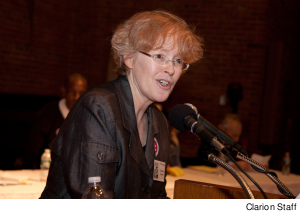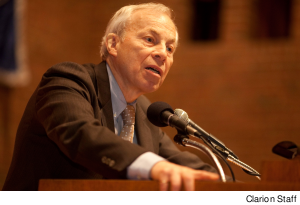Vote your conscience.” That’s the message from the University Faculty Senate (UFS) and the PSC to CUNY faculty who are deciding on proposed new courses under CUNY’s Pathways initiative.


“Pathways is not inevitable,” UFS Chair Terrence Martell and PSC President Barbara Bowen wrote in an open letter to CUNY faculty. “We have the power to say yes or no to its implementation.”
The letter points out that “the courses developed for the Pathways core curriculum must be approved by the elected faculty governance bodies on each campus before they can be put in place.” Martell and Bowen emphasize that “as faculty, we have the right – in fact, the responsibility – to vote in the best interest of our students on matters of curriculum.”
“Whatever your judgment is, you have the right to vote your conscience,” Martell and Bowen write. “Voting according to the professional standards of your discipline is a matter of academic freedom.”
A CHOICE
The two leaders acknowledge that some faculty members have worked hard on the development of these new courses and have done their best. But they were not working within a structure of their own choosing, Bowen told Clarion. Many who served on these committees are not satisfied with the result. “The question they are asking is this,” she said: “This may be the best that is possible under Pathways – but is it good enough for CUNY students?”
In short, she said, “We want faculty to know that they do have a choice.”
Pathways, CUNY’s controversial overhaul of general education and transfer requirements, has engendered strong opposition from CUNY faculty since it was adopted by the Board of Trustees in 2011. It strictly limits the number of credits that CUNY colleges can require for general education, a change that the University’s central administration claims will help transferring students avoid delays as they work toward their degree. Faculty opponents of the Pathways plan say that it will dilute the quality of education at CUNY without solving most transfer problems. (For more, click here.) A large majority of CUNY’s elected faculty bodies are opposed to Pathways.
With the start of the new semester, departments and college senates began to meet – and proposed new courses designed to fit the Pathways framework have been central items on their agendas.
When the English Department at Queensborough Community College met on September 12, 2012, its members voted against a Pathways-related course proposal by a more than two-to-one margin. The rejected course proposals included two composition courses that would have been for three credits and three hours, abandoning QCC’s long-standing model of three credits and four hours for such classes. This has been a common structure in English departments across CUNY, one which many departments found was the best way to ensure that students could get the individual attention they need.
BEST PRACTICE
Last semester, CUNY’s English Discipline Council noted that the three-credit/four-hour format was “the dominant pattern” across CUNY. More important, in the Council’s opinion it constitutes a “best practice.” Four hours a week are needed “to prepare students adequately for the challenges of academic writing in their undergraduate careers,” the Council explained. “To reduce contact hours would be to deny students the benefits of individualized instruction, to diminish the amount of writing they do during the semester, and to undermine established pedagogic practices within CUNY.”
“We need that fourth hour,” a member of QCC’s English Department told Clarion. “It means more time with our students, more time on task. In some schools it’s called a ‘lab hour’; we call it a ‘recitation hour.’ It’s a pedagogical improvement that’s become pretty standard in composition courses around the country.
“We had some very senior people who stood up and said, ‘I can’t vote for this,’ and that kind of opened it up for others to vote their conscience,” the department member concluded.
“It is imperative that faculty members not be afraid to vote their conscience in departmental votes on Pathways courses,” Brooklyn College’s acting PSC chapter chair, Alex Vitale, wrote to fellow faculty members in a September 10, 2012 e-mail. Toward that end, Vitale said, “we urge faculty: (1) to call for a secret ballot in departmental votes, so that junior faculty can exercise their professional judgment without fear of reprisal; and (2) to approve only those courses that you believe maintain the integrity of a Brooklyn College education.”
DECISIONS
Vitale recognized the conflicting pressures felt by many faculty who think Pathways is a bad idea but are tempted to go along with it. “We understand that many departments are concerned that, if they do not cooperate with the administration, they will put their department and their students at a disadvantage,” he wrote. “As a result, many of the faculty in these departments have hedged by voting against Pathways in principle while moving forward with implementation.” But this cooperation under protest, Vitale wrote, is “what the administration is hoping for,” since it allows them to pursue a “classic divide-and-conquer strategy.”
By picking off departments one at a time and securing their consent, Vitale explained, the administration hopes to be able to muscle Pathways through to implementation – even if many faculty bodies offer political criticism along the way. Noting that the last Stated Meeting of Brooklyn College faculty had rejected Pathways by a vote of approximately 190 to 1, he urged faculty to “hold firm” and “reject any courses…that undermine quality education.”
Meanwhile the joint PSC-UFS lawsuit against Pathways continues to move through the courts. On August 23, 2012, the plaintiffs responded to CUNY’s motion for dismissal.
The union-Senate lawsuit charges that the adoption of Pathways was in violation of a 1997 settlement agreement between CUNY and the heads of the PSC and UFS. In that settlement, CUNY agreed that the University Faculty Senate was responsible, subject to guidelines that might be established by the trustees, for the “formulation of policy relating to…curriculum, awarding of college credit, and the granting of degrees.”
CUNY’s motion to dismiss the lawsuit argues that since it is ultimately the trustees who decide University policy, the board had full authority to adopt its Pathways resolution in 2011. The union and UFS responded that they have always acknowledged the board’s policy-making role. But “while it is ultimately the CUNY Board which decides what policy to implement, it is the UFS which, in the first instance, formulates that policy,” the union and Senate contend.
“CUNY, by its own admission, implemented Pathways without any involvement of the Faculty Senate,” notes the PSC-UFS response. Thus, it concludes, the trustees’ vote to establish Pathways was a direct violation of the 1997 settlement. A ruling is expected sometime this fall.
______________________________
RELATED COVERAGE:
Letter to CUNY Faculty
Faculty Pan Pathways at Public Hearing, Plan to Develop Alternative
Perspectives on Pathways
5,676 Faculty Petition for Pathways Repeal
Pathways Under Fire: Calls for a Halt Are Growing

